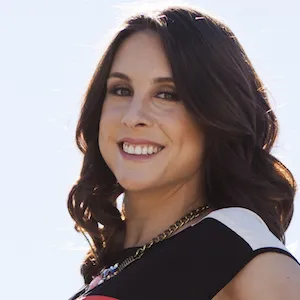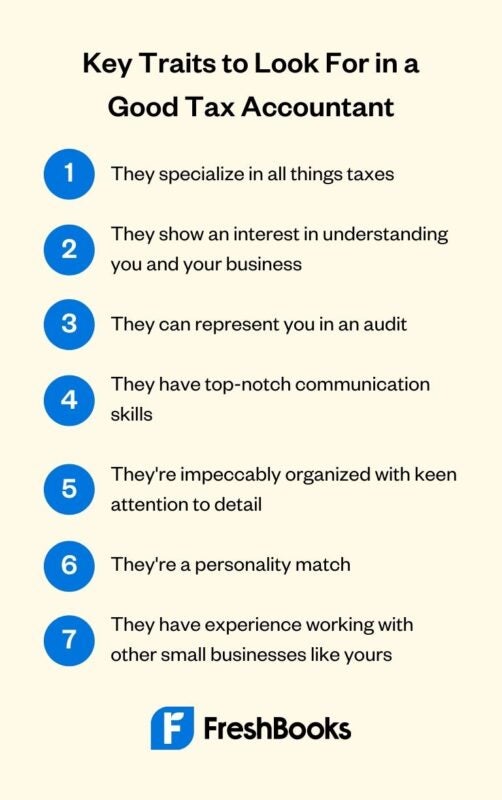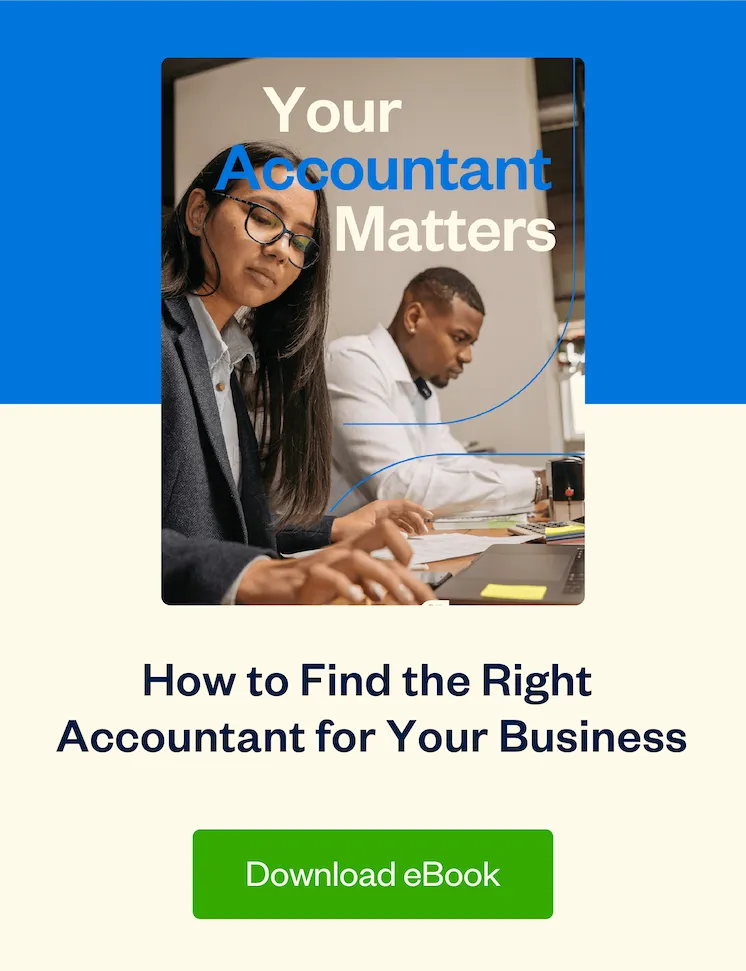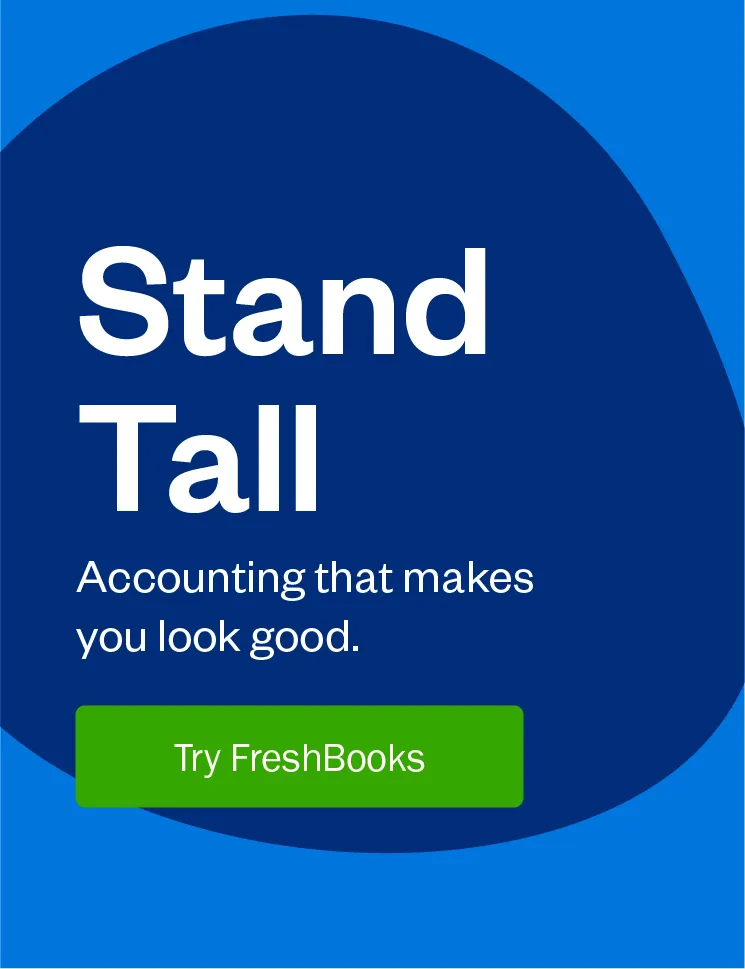Finding an accountant is easy, but finding the right one for you and your business can be a challenge. Here's how to find a good accountant—and the key traits to look for.

Hiring a tax professional can be a straightforward process, but choosing the right one for your unique tax situation requires a little more thought. Whether you’re managing your personal finances or overseeing a small business, finding a good accountant means knowing what to look for.
A tax preparer with an in-depth understanding of tax laws and financial data, including up-to-date knowledge of the IRS and state boards, is crucial. From helping you file your tax return accurately to explaining complicated concepts, a good accountant brings leadership skills, problem-solving abilities, and personalized service to the table.
So, instead of typing a phrase into Google like “list three things you should look for when hiring a tax professional” we’ve compiled a much better list with input from accountants themselves.
This guide will explore the important qualities to look for in a successful accountant, from their accounting credentials—like an accounting degree or being a Certified Public Accountant (CPA) or Enrolled Agent—to their ability to handle sensitive information and provide strategies for minimizing tax liabilities. Let’s dive into how you can find the best tax professional to support your business, plan for the future, and help you avoid costly mistakes during tax season.
Here’s where we’ll start:
- How to find a good accountant.
- The key traits you should look for.
- How to choose the best accountant for you, your business, and your tax needs.
Table of Contents
Why You Might Want to Hire a Tax Accountant
Before we dive into the details of finding a good accountant and the key traits you should look for, let’s take a moment to explore why hiring a tax professional might be the right choice for you and your business.
Hiring a tax preparer can be a game-changer, especially when you’re managing complex financial data, dealing with a tricky tax situation, or simply trying to avoid mistakes that could cost you down the line. Here are three key reasons why small business owners and individuals alike consider hiring a tax professional:
1. Business Taxes Are More Complex Than Personal Taxes
While personal taxes might feel straightforward, especially when you’re using tax software or filing on your own, business taxes are an entirely different ballgame. Small business owners, in particular, often face more complicated financial situations, including managing financial statements, crunching numbers, and navigating tax deductions that may be unfamiliar.
A tax professional has an in-depth understanding of both personal and business taxes, ensuring that everything from income reporting to tax return filing is handled with precision. Whether you’re a new client or a long-term one, a tax preparer who knows how to deal with complicated concepts can make tax season less stressful. Their ability to provide personalized service for your unique financial situation will keep you on track.
2. Accountants Stay Up to Date with Changing Tax Laws
Tax laws are constantly evolving. From new credits and deductions to updated IRS regulations, it’s a lot to keep track of. Without up-to-date knowledge, you risk missing out on money-saving strategies or even making costly mistakes on your tax return.
A successful accountant has a responsibility to stay current with tax laws and updates, including those from state boards and the government. This ensures that your taxes are filed with the most accurate and current information, reducing the chances of errors and missed opportunities. By leveraging their industry knowledge, accountants can help you maximize your tax savings and avoid pitfalls during tax season.
3. Mistakes on Your Taxes Can Lead to Expensive Consequences
The stakes are high when it comes to taxes. Mistakes—whether they involve miscalculating deductions, omitting income, or filing late—can lead to costly consequences, such as penalties, audits from the IRS, or financial scrutiny.
Hiring a tax preparer significantly reduces the risk of making these mistakes. A good accountant brings problem-solving skills and integrity to the table, ensuring your financial information is filed correctly. Additionally, tax professionals are experts in managing confidential information and handling sensitive data, which means you don’t have to worry about your financial situation being mishandled. Their leadership skills and commitment to avoiding mistakes will give you peace of mind, knowing that your tax filing is in capable hands.
Hiring a tax professional can be an important step in managing your finances and securing your business’s success. But how do you find the right one? Let’s take a closer look at the traits that make up a great accountant.
The Key Traits You Should Look for in a Good Tax Accountant
Before you hire a tax professional to manage your business taxes, it’s crucial to understand what makes a great accountant. Tax preparation, especially for small business owners, can be complex, and finding the right accountant can make all the difference in your financial situation. Here are some important traits to consider when looking for a good accountant:
1. Specialize in Taxation and Stay Up to Date
Not every accountant is qualified to handle your business taxes. Simply having an accounting degree or experience in accounting doesn’t necessarily mean they specialize in the complexities of tax preparation. A successful accountant who understands tax laws, the IRS, and state boards is essential for managing the ever-changing world of taxes.
Business taxes, especially for small businesses, are significantly more complicated than personal taxes. A tax professional who specializes in tax preparation has an in-depth understanding of the latest updates to tax laws and can ensure your tax return is filed correctly, with all the appropriate deductions and strategies. These professionals also possess a Preparer Tax Identification Number (PTIN), which is required to legally prepare taxes.
2. Show Genuine Interest in Understanding Your Business
Every business, including yours, has a unique tax situation. The right tax preparer will show a genuine interest in understanding the ins and outs of your business’s finances, including financial data, financial statements, and other financial information. By asking the right questions and reviewing your business’s financial statements, they can develop tailored tax strategies that reflect your specific circumstances.
A good accountant doesn’t take a one-size-fits-all approach. They will take the time to understand the particular challenges you face and customize their tax preparation to best suit your needs. This personalized service helps you maximize your savings and minimize your risks, particularly during tax season.
3. Have Experience with Small Businesses
Filing taxes for a small business is different from filing for larger corporations. A successful accountant who has worked with other small businesses will be more adept at navigating the complicated concepts that often arise. From crunching numbers to understanding financial planning, they will have experience helping small business owners file taxes and handle their financial situation with ease.
Accountants who specialize in small businesses know the ins and outs of handling confidential information, deductions, and the unique circumstances small business owners face. This expertise ensures that you receive accurate and timely tax filings while avoiding costly mistakes.
4. Highly Organized with Attention to Detail
Business taxes come with many moving parts, and the right accountant needs to be exceptionally organized. From gathering the necessary financial data to filling out forms and meeting deadlines, there is a lot to keep track of. A well-organized accountant will have a system in place to manage all aspects of your tax preparation, ensuring nothing is overlooked.
A good accountant will also have a keen eye for detail, reviewing every tax return carefully to avoid any errors. This attention to detail can prevent costly issues down the line, such as audits from the IRS or fines for missing information.
5. Excellent Communication Skills
Your accountant needs to be more than just good with numbers—they must also be able to communicate clearly. Tax preparation can be a complicated process, and it’s essential that your accountant can explain complicated concepts in a way that makes sense. Whether it’s answering questions about tax deductions, explaining strategies to minimize your liabilities, or keeping you updated on the status of your tax return, effective communication is key.
Look for a tax professional who is accessible and responsive, ensuring that you stay in the loop throughout the entire tax preparation process. Open communication will make it easier for you to understand what’s happening with your taxes, and it will help build a positive relationship with your accountant.
6. A Personality Fit
It’s important to feel comfortable with the person managing your financial situation. You’ll be working closely with your tax accountant during tax season and potentially throughout the year, so finding someone whose personality aligns with yours can make the process much smoother.
While it’s not necessary to become best friends, having a good rapport with your tax preparer will make it easier to communicate openly and build a long-lasting relationship. A team player attitude and mutual respect are important qualities in this working relationship.
7. Able to Represent You in an Audit
While no one expects an audit, it’s always a good idea to hire an accountant who can represent you in case the IRS comes knocking. Certified Public Accountants (CPAs), Enrolled Agents (EAs), and attorneys are the only tax professionals with the credentials to represent you in an audit.
If you hire a tax professional without these qualifications, you could find yourself facing an audit without the help of a qualified representative. Be sure to verify their credentials to avoid this risk and ensure you’re in good hands.
By keeping these traits in mind, you can find a tax professional who will not only help you with tax preparation but also provide valuable financial planning support for your small business.
How to Find a Good Accountant
Now that you understand the key traits to look for in a tax professional, the next step is finding the right one. Whether you’re seeking help with tax preparation for your small business or managing your personal finances, there are several ways to locate an accountant who is a good fit for your financial situation. Here are a few methods to help you find a reliable and experienced accountant.
1. Ask for Referrals
One of the best ways to find a good accountant is by tapping into your network. Referrals from people you know and trust can be invaluable when seeking a professional who is not only skilled but also reliable. Ask colleagues, friends, and family members if they have a tax preparer they trust with their tax returns and financial information.
Many small business owners rely on long-lasting relationships with their tax professionals, so recommendations from people who have already worked with a team player can point you toward someone who is well-versed in handling the complexities of taxes.
2. Tap into Professional Organizations
Another excellent resource for finding a qualified accountant is professional organizations. These networks help ensure that tax professionals stay updated on the latest industry standards, IRS regulations, and tax strategies. By reaching out to local or national organizations, you can find accountants who have a proven track record in the field.
Some well-regarded associations include:
- National Association of Tax Professionals (NATP)
- National Association of Enrolled Agents (NAEA)
- American Institute of Certified Public Accountants (AICPA)
These organizations often maintain directories of certified tax preparers, Certified Public Accountants (CPAs), and Enrolled Agents who specialize in business and personal tax situations.
3. Seek out Experts/Thought Leaders
In addition to traditional accountants, consider looking for professionals who have established themselves as thought leaders in the tax and finance world. These professionals often go above and beyond simply providing tax services—they share their knowledge through blogs, articles, and even speaking engagements.
Tax accountants who take the time to educate others are likely passionate about their career path and are deeply invested in helping clients make the most of their finances. Whether they write a column for a local paper, host a podcast, or run a business finance blog, a tax professional who shares their expertise with others is often a good indication that they are highly knowledgeable and interested in staying ahead of industry changes.
4. Read Online Reviews
You should always take online reviews with a grain of salt. But if there’s a local tax professional with hundreds of five-star reviews across Yelp, Google and other review sites, they at least warrant an exploratory phone call. (Bonus: Online reviews can also give you insights into tax professionals you don’t want to work with.)
How to Vet Your Tax Accountant
Once you’ve got a solid list of potential tax professionals, you need to vet them to figure out which are the best fit for you.
To vet your tax accountants, you’ll need to:
1. Figure out the Best Type of Tax Professional for You
As mentioned, there are three types of tax professionals you’ll want to consider for your business taxes: CPAs, EAs, and attorneys. None of them are necessarily “better” than the other, but understanding the differences can help you figure out the best tax professional for you and your business.
- Enrolled agents (EAs) are tax professionals who go through a licensing process with the IRS (which includes thorough background checks, an exam, or at least five years of experience working at the IRS and continuing education requirements). The benefit of working with an EA is that their business is focused entirely on taxes (unlike CPAs and attorneys, who may also practice in other areas)
- Certified Public Accountants (CPAs) are accountants who have been certified by the state after passing their qualifying exams and satisfying their education and experience requirements. CPAs are true professionals when it comes to accounting and can often advise you on other financial issues. Not all CPAs, however, specialize in taxes, so it’s important to ask about their experience with small business taxes before you work with them
- Tax attorneys are lawyers who specialize in tax law. While having an attorney prepare your taxes is often unnecessary (and more expensive than other options), they can definitely be helpful if your taxes are extremely complex or you’ve had issues with the IRS in the past
2. Write Your Interview Questions
Before you start talking to tax professionals, you need to know what you’re going to say. Writing out your interview questions ahead of time will ensure you get all the information you need to make an informed decision on whether an accountant is the right fit for you and your business.
Some questions you should consider asking during your accountant interview include:
- What do your services include?
- Do you have experience working with small businesses?
- Do you have experience within my industry?
- What are your fees?
- How do you bill for your tax preparation services? (e.g., is there an upfront cost or do you pay for your taxes upon completion?)
- What’s your preferred method of communication? How long does it take for you to respond to e-mails, phone calls, etc.?
- Are there any other financial services you offer to small businesses? If so, what are they? (Only relevant if speaking to a tax attorney or CPA)
- Will you represent my business in the event of an audit?
3. Interview Multiple Accountants
Once you know what kind of tax professional you want to work with—and what questions you want to ask—it’s time to actually start the interview process.
To get a real sense of what’s out there and what different professionals have to offer, you should plan on interviewing multiple accountants.
While there’s no magic number, interviewing four to five accountants will give you plenty of information to work with and help you better evaluate each tax professional.
4. Ask for Client Referrals
Any tax accountant you speak to is going to try to sell you their services. So even if they say everything you want to hear, you need to take it with a grain of salt.
Asking for client referrals is a great way to get better insight into what it’s actually like to work with that tax accountant. Former and/or current clients can tell you about their communication style, the quality of their service, and any issues they had during their working relationship.
Any good tax accountant will be confident in their client’s satisfaction and happy to put you in touch with them. If they’re not and refuse to connect you with any of their former or current clients consider it a red flag.
Choosing the Right Tax Accountant for You
You’ve narrowed down the pool of potential tax accountants. You’ve interviewed them, asked for references, and reviewed their credentials and services. But how do you choose the right accountant for you?
If you can’t decide which tax professional is right for you, some additional factors you might want to consider include:
1. Fees
The cost shouldn’t be the only factor you consider when choosing a tax accountant—but it certainly plays a part. While you don’t want to cut corners when it comes to doing your business taxes, you also don’t want to put yourself in debt. Make sure when you’re hiring a tax accountant that their fees are in line with your budget.
2. Availability
Some accountants get completely swamped during tax season and might not have the availability to give your taxes the time and attention they deserve. Before you hire a tax accountant, make sure to ask about their availability, the speed of their communication (you don’t want your e-mails to go unanswered for days!), and how much time they have for things like reviewing paperwork or answering tax-related questions.
3. Experience with Your Industry
While a tax accountant doesn’t need to have experience within your industry, it certainly doesn’t hurt! If you’re having a hard time narrowing down potential tax accountants, experience within your industry should move an accountant further up the list.
Know the Traits to Look for in a Tax Accountant
Not every small business wants or needs to hire an accountant to handle their taxes. But if you do need a little extra support when tax time rolls around, you now have the tools you need to find, vet, and hire the best accountant for you and your business.
Below are some key traits to look for in a good tax accountant:
- They specialize in all things taxes.
- They show an interest in understanding you and your business.
- They can represent you in an audit.
- They have top-notch communication skills.
- They’re impeccably organized with keen attention to detail.
- They’re a personality match.
- They have experience working with other small businesses like yours.
This post was updated in January 2025.

Written by Deanna deBara, Freelance Contributor
Posted on December 11, 2019
This article was verified by Janet Berry-Johnson, CPA and Freelance Contributor

 Your Complete Guide to Small Business Tax Credits
Your Complete Guide to Small Business Tax Credits Everything You Need to Know About How to Lower Self-Employment Taxes
Everything You Need to Know About How to Lower Self-Employment Taxes Bookkeeping vs. Accounting: What’s the Difference, Anyway?
Bookkeeping vs. Accounting: What’s the Difference, Anyway?







